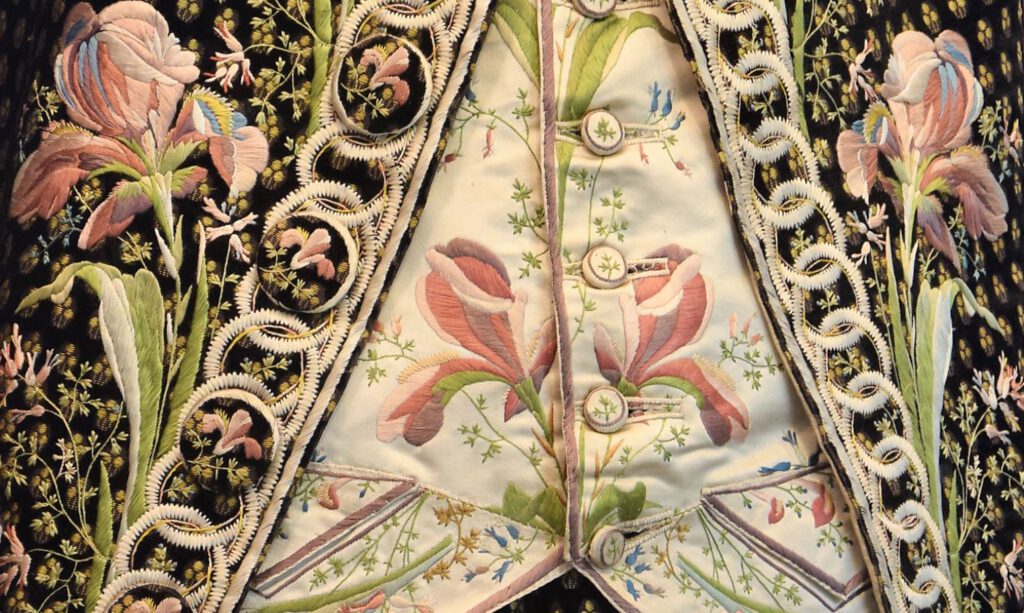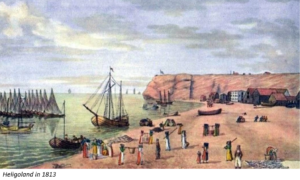
This beautiful gala dress-suit was made in the seconded half of the 18th century. Enjoy some pictures of a truly splendid garment and read more about its owner: an Italian aristocrat with liberal ideas and close links to Napoleon.
Continue reading
This beautiful gala dress-suit was made in the seconded half of the 18th century. Enjoy some pictures of a truly splendid garment and read more about its owner: an Italian aristocrat with liberal ideas and close links to Napoleon.
Continue reading
Around the turn of the 19th century, Joseph Mallord William Turner was a young, restless painter, always on the lookout for inspiration for his art. After having toured many parts of Britain, he planned to visit the Continent. He was especially interested in the awe-inspiring, romantic Swiss Alps – considered by many a rocky, dangerous wasteland. Thus, aged about 27, and still being an unknown artist, he decided to follow his plans through. Let’s accompany him on his first ever trip abroad.
Continue reading Captain Corbet James D’Auvergne could lay claim to knowing Jane Austen. The authoress mentions him in two letters to her sister Cassandra. Read more about Captain D’Auvergne connection to Jane Austen, and his achievements as Acting Governor of a tiny island in the North Sea called Heligoland.
Captain Corbet James D’Auvergne could lay claim to knowing Jane Austen. The authoress mentions him in two letters to her sister Cassandra. Read more about Captain D’Auvergne connection to Jane Austen, and his achievements as Acting Governor of a tiny island in the North Sea called Heligoland.
After a ball at the Dolphin Hotel in Southampton in December 1808, Jane Austen – proficient as ever in summing up a gentleman’s potential as a spouse – noted that Corbet James D’Auvergne was both a captain in the Royal Navy and a ship owner. The remark might have been a joke about husband-hunting, but the Captain was indeed a good catch for a lady looking for hero-material in her husband. Besides, he was still single. Any lady furthering her acquaintance with him should know, however, that he had his hands in large-scale smuggling.
Continue reading
On 14 December 1833 in Ansbach, a small town in Bavaria, a young man staggers home with a deep wound in his left breast. He states that he was lured to the Court Garden where a stranger stabbed him while giving him a small bag. The young man is known as Kasper Hauser, a local celebrity of his time, and also a mysterious youth of unknown origin.
A policeman searches the Court Garden. He finds a purse containing a note in mirror writing indicating in riddled form the attacker’s identity. He finds neither the weapon involved nor any other helpful evidence. Kasper Hauser dies of his wound three days later.
The death of Kasper Hauser in 1833 is a one of the most famed-famous unsolved cases of criminology. Until today, we don’t know for sure whether the young man was murdered or died by inflicting himself a wound with a knife that penetrated much deeper than he had intended. Until today, we don’t even know who Kasper Hauser was: an imposter, a hereditary prince, an innocent boy?
The story of Kaspar Hauser, a ‘feral child’, who claimed to have lived in isolation and captivity, has all ingredients of a novel of Mrs. Radcliffe: political intrigue, espionage, and conspiracy theories. But what has the English aristocrat, Philip Henry Lord Stanhope, 4. Earl Stanhope (1781-1855), to do with the young man, his secret and his death? Continue reading
 Which topics and anniversaries will be important for Regency Enthusiasts in 2019? This year marks the 200th or 250th anniversary of the following political, scientific and literary events:
Which topics and anniversaries will be important for Regency Enthusiasts in 2019? This year marks the 200th or 250th anniversary of the following political, scientific and literary events:
Continue reading
In this post:
– Ravenna and the poetry of politics
– Plotting insurrection: the tight situation in Italy
– Murder!
– Byron and the secret society of the Carbonari
– Under surveillance and attack
Lord Byron (1788 – 1824), a man of scandals, had by 1815 crowned his wild life with a stormy affair with Lady Caroline Lamb, and a breakup with his wife. He left England to travel the Continent. True to the verdict ‘mad, bad and dangerous to know´’, he didn’t led a virtuous life there. In December 1819, he arrived in Ravenna, Italy, where he took up residence to be near his mistress Teresa Guiccioli, a married woman. There was more scandal and adventure to come: Byron became involved in the national movement in Italy – meaning secret societies plotting insurrection against the Austrian und clerical rulers. Indeed it was in Ravenna that Byron found his calling in serious political activities. Continue reading
‘Dr Brighton’ was the affectionate nickname given to Dean Mahomet, an Indian immigrant who opened the first commercial “shampooing” vapour masseur bath in Brighton.
“Shampooning”, a type of Turkish bath, gave full relief to ailments such as rheumatic and paralytic, gout, stiff joints, old sprains, lame legs, aches and pains in the joints”. Dean Mahomet’s business proved to be so successful that hospitals referred patients to him and he was appointed as shampooing surgeon to both King George IV and William IV. Continue reading
 In this post:
In this post:
– The movie
– New non-fiction books about Mary Shelley scheduled for 2018
– Frankenstein Events
The year 2018 marks the 200th anniversary of the publication of Mary Shelley’s Frankenstein; or The Modern Prometheus. We can look forward to a global celebration of Shelley’s work with a variety of exhibitions, research projects, scientific demonstrations, competitions, festivals, art projects, and publications. Continue reading
 Rachel Charlotte Williams Biggs (c. 1763—1827) lived an incredible life in an age when the world was dominated by men. Joanne Major and Sarah Murden, dedicated historians and authors of several non-fiction books about the Georgian Age, have written an amazing biography about an extraordinary lady. In A Georgian Heroine: The Intriguing Life of Rachel Charlotte Williams Biggs, they uncover the bizarre but true story of Mrs. Biggs, who was a playwright and author, a political pamphleteer and a spy, working for the British Government. It’s a treat for me to present Sarah’s and Joanne’s post about Mrs. Biggs’ connection to the man who plotted to kill Napoleon.
Rachel Charlotte Williams Biggs (c. 1763—1827) lived an incredible life in an age when the world was dominated by men. Joanne Major and Sarah Murden, dedicated historians and authors of several non-fiction books about the Georgian Age, have written an amazing biography about an extraordinary lady. In A Georgian Heroine: The Intriguing Life of Rachel Charlotte Williams Biggs, they uncover the bizarre but true story of Mrs. Biggs, who was a playwright and author, a political pamphleteer and a spy, working for the British Government. It’s a treat for me to present Sarah’s and Joanne’s post about Mrs. Biggs’ connection to the man who plotted to kill Napoleon.
 It’s 1798. Admiral Horatio Nelson is on a mission to support the Neapolitan monarchy in Naples. He has already made a remarkable carreer, even if his greatest success is still to come. He is also marked by war: He has lost an arm and suffers from coughing spells. In Naples, he stays with the British Ambassador Sir William Hamilton, and his wife lovely Emma Hamilton.
It’s 1798. Admiral Horatio Nelson is on a mission to support the Neapolitan monarchy in Naples. He has already made a remarkable carreer, even if his greatest success is still to come. He is also marked by war: He has lost an arm and suffers from coughing spells. In Naples, he stays with the British Ambassador Sir William Hamilton, and his wife lovely Emma Hamilton.